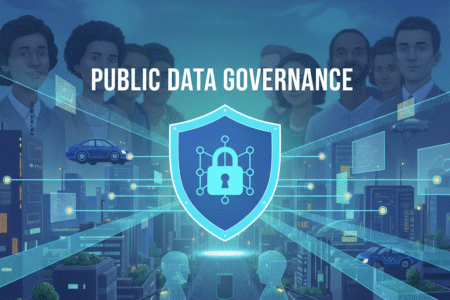Introduction / Overview
Everywhere we look, cities are branding themselves as “smart.” New metro lines come with digital displays, traffic is managed through sensors, and government apps promise seamless service delivery. In India, the Smart Cities Mission has turned this dream into a national project, transforming urban spaces with technology. But behind the buzzwords, there’s a deeper issue at play—public data governance. Who controls the vast amounts of data being collected in these cities? How do citizens know if their data is being used responsibly? And perhaps most importantly, how do we ensure that smart cities are not just efficient, but also trustworthy?
This blog explores these questions in depth. We’ll look at how data is collected, what risks it poses, global examples of good governance, and how ICPR proposes to build transparent, citizen-first data systems for India’s urban future.
The Data Behind Smart Cities
A smart city runs on data. Consider these examples:
- Traffic Sensors: Monitoring vehicle flow to reduce congestion.
- CCTV and Facial Recognition: Tracking safety incidents but also raising privacy concerns.
- Public Wi-Fi: Offering free internet while logging citizen browsing behavior.
- Utility Meters: Tracking water, electricity, and waste usage in real time.
Each of these technologies generates enormous amounts of personal and community data. In most Indian cities, this data is stored in centralized dashboards managed by private contractors in partnership with municipal governments.
While these systems promise efficiency—better traffic management, smarter electricity grids, cleaner waste systems—they also introduce risks. Without proper governance, citizens risk becoming mere data points in corporate spreadsheets, rather than empowered participants in their cities.
The Risks of Poor Data Governance
- Loss of Privacy: Many citizens don’t know what data is being collected, let alone how long it is stored. For example, facial recognition systems in Hyderabad raised concerns when citizens discovered their movements were logged without consent.
- Opaque Systems: Smart city dashboards often operate as “black boxes.” Citizens can see flashy maps and charts but don’t know who has access to the raw data or how decisions are made from it.
- Commercial Exploitation: Data collected for civic purposes is often repurposed for commercial gain. For example, location data collected by Wi-Fi providers can be sold to advertisers.
- Digital Exclusion: Citizens without smartphones or digital literacy are often left out of data-driven services. This widens urban inequality rather than reducing it.
Global Models: What We Can Learn
- Barcelona, Spain: Adopted a citizen-first data charter, ensuring residents control how their personal data is used. Citizens can even download their personal “data footprints.”
- Singapore: Uses centralized data models but ensures efficiency through strict government oversight. The downside: limited citizen input.
- Tallinn, Estonia: Pioneered digital transparency by allowing citizens to see which government official accessed their personal records.
India’s smart city program is ambitious, but it risks losing public trust if it doesn’t integrate citizen oversight mechanisms from the beginning.
ICPR’s Approach: Transparent Data Governance
At ICPR, we believe data belongs to the people, not just the platforms that collect it. Our civic-grade proposals include:
- Glossary-Driven Dashboards
Instead of technical jargon, every smart city dashboard should include a glossary explaining terms like “anonymized data,” “third-party sharing,” or “metadata.” Citizens deserve to understand what these mean in plain language. - Changelog Tracking
Whenever data policies change—such as new third-party contracts or updated storage timelines—citizens should see an entry in a public changelog. No hidden updates, no buried clauses. - Contributor Vaults
Citizens should have access to their own data footprint. Imagine logging in to a city portal and downloading your personal data file: water usage, electricity patterns, health app records—everything that’s stored about you. - Rollback-Ready Policies
In case of data misuse or breach, rollback options should be built into the system. Citizens should be able to revoke permissions and demand deletion.
Building Trust: The Way Forward
Smart cities can thrive only if citizen trust is the foundation. Building this trust requires three commitments:
- Transparency First → Citizens must see and understand how their data is used.
- Accountability Mechanisms → Breaches should trigger legal consequences, not silent cover-ups.
- Citizen Participation → Residents must have a say in how data is collected, shared, and secured.
Conclusion
The dream of smart cities is not just about faster traffic lights or digital dashboards. It is about creating urban ecosystems that respect and empower citizens. Data can be a powerful tool, but without governance, it becomes a liability.
India stands at a crossroads: will its smart cities become surveillance hubs or models of transparent, citizen-first governance? The answer depends on the choices we make now.
At ICPR, we are launching the Citizen Data Glossary Project—a collaborative effort to simplify and democratize the language of urban data governance. If you are a civic technologist, researcher, or simply a concerned resident, join us in shaping smart cities that are not only intelligent but also trustworthy.

Leave a Reply